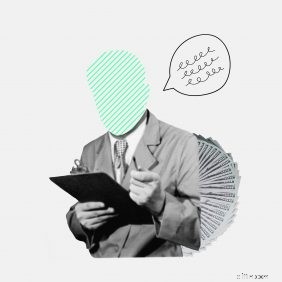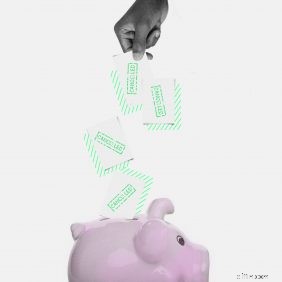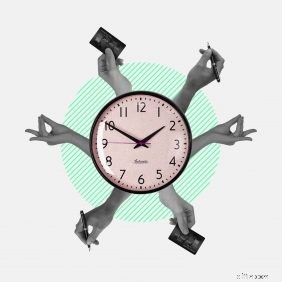50 maneiras de economizar dinheiro agora
Você tem que fazer isso sozinho.
Se há uma lição a ser aprendida com a devastação financeira causada pelo coronavírus em 2020, que seja esta:a ajuda está disponível, mas não virá apenas para você.
Este ano, você pode levar isso literalmente. Como os americanos que passaram os últimos meses em distanciamento social estão bem cientes, no final do dia você está sozinho. E embora haja uma série de programas de ajuda disponíveis para os milhões que foram desviados financeiramente, quase todos vêm com a mesma corda.
“Você tem que pedir – e pedir do jeito certo”, como disse recentemente Liz Weston, da NerdWallet.
Sob a lei de estímulo do governo federal, por exemplo, se você foi afetado pelo COVID-19, você tem o direito de receber uma “acomodação” do emissor do seu cartão de crédito, que pode incluir isenção de taxas atrasadas, taxas de juros mais baixas ou até mesmo o capacidade de pular pagamentos - sem afetar negativamente seu relatório de crédito. Mas, para obter essa acomodação, você precisa fazer o trabalho braçal ligando para o emissor do cartão de crédito e solicitando.
Da mesma forma, a mesma lei lhe dá o direito de solicitar uma tolerância em uma hipoteca apoiada pelo governo federal por pelo menos 180 dias, o que significa que você pode pular pagamentos sem acumular taxas atrasadas ou juros adicionais. Esses pagamentos podem ser devidos de uma só vez no final dos seis meses, ou você pode adicioná-los até o final do seu prazo – mas, novamente, você precisa ligar para o seu credor e perguntar.
Não são apenas programas governamentais. Em março, a divisão de financiamento de automóveis do Ally Bank disse que daria aos novos clientes uma pausa em seu primeiro pagamento por 90 dias. O Bank of America disse que adiaria os pagamentos dos empréstimos e os adicionaria ao final do prazo. O TD Bank disse que dispensaria as taxas para sacar contas de CD antes do vencimento total. Mas em cada caso - você adivinhou - você tinha que ligar e perguntar.
O governo está adicionando US$ 600 extras aos benefícios semanais de desemprego até julho. Isso é automático... se você conseguir obter benefícios em primeiro lugar. Chegar aos escritórios estaduais de desemprego tornou-se um esforço hercúleo à medida que os sistemas arcaicos de repente ficam inundados. Na verdade, relativamente poucos programas de socorro eram automáticos. Os cheques de estímulo estavam, dentro de certos limites de renda, assim como os programas de tolerância para empréstimos estudantis federais (mas não privados).
Caso contrário, é com você. E de certa forma, dizem os especialistas em finanças pessoais, é assim que sempre foi. Ninguém vai cuidar de suas finanças do jeito que você faria – nem um corretor, um contador ou consultor financeiro. E certamente não o governo.
“Esse era meu objetivo quando abri o Suze Orman Financial Group:tornar as pessoas o mais independentes possível de pessoas como eu”, diz a autora de finanças pessoais e podcaster Suze Orman. “Quando comecei minha empresa, [meus clientes] tiveram que ir até a Charles Schwab e abrir sua própria conta. Eles me pagariam uma taxa de consultoria. Eu não administrava dinheiro – porque queria que eles entendessem que podiam administrar seu próprio dinheiro.”
“Se você quer encontrar o melhor consultor financeiro do mundo, olhe no espelho”, diz Orman. “Porque ninguém vai se importar mais com seu dinheiro do que você.”
Orman diz que espera que aqueles que foram forçados a sair de um buraco financeiro este ano não esqueçam o quão difícil é – e se esforcem para se colocar em uma posição em que não precisem depender de outras pessoas na próxima vez.
Se você está pronto para assumir o controle do seu dinheiro este ano, aqui estão 50 lugares aprovados por especialistas para começar.
Com reportagem de Kara Cutruzzula. Ilustrações de Elisa Faye.
Consulte os Serviços de Aconselhamento de Crédito
 Ilustrações de Elisa Faye
Ilustrações de Elisa Faye Você não precisa passar por uma situação financeira difícil por conta própria. Se você tem uma grande quantidade de dívida com juros altos ou simplesmente quer aconselhamento sobre orçamento e economia, um consultor de crédito certificado pode fornecer aconselhamento individual gratuito ou de baixo custo. Comumente oferecido por meio de organizações sem fins lucrativos, o aconselhamento de crédito é uma opção de baixo risco que ajuda você a ter uma visão mais clara de sua situação financeira. A Consolidated Credit lançou o Shutdown Hotline, um serviço telefônico gratuito que oferece análise de dívidas e encaminhamento para recursos específicos da COVID-19. E a National Foundation for Credit Counseling (NFCC) também está oferecendo serviços gratuitos de aconselhamento de crédito dedicados a ajudar as pessoas à luz da pandemia.
Leia mais
Crie seu 'Número de Sobrevivência'
Muitas pessoas estão se esforçando para economizar agora – até onde você pode ir? Para determinar o seu “número de sobrevivência”, some todos os custos mensais do seu mínimo essencial:aluguel, alimentação, assistência médica etc. Você não precisa necessariamente viver com seu orçamento de sobrevivência, e calcular um não significa que você estão adotando uma mentalidade de escassez. Na verdade, há poder em saber o quão engenhoso você pode ser, escreve a colaboradora do NextAdvisor Jully-Alma Taveras, criadora do canal do YouTube Investing Latina. O número de sobrevivência de Jully-Alma é $ 581; use a planilha para download dela para descobrir a sua.
Leia mais
Abrir uma conta de cobrança
Isso é ideal se você costuma pagar suas contas com atraso ou se endividar. Sierra Howard, da @IDontDoBudgets, recomenda criar uma conta de cobrança dedicada calculando todas as suas despesas mensais fixas e adicionando uma almofada de US$ 50 (para evitar taxas de saque a descoberto). Configure uma conta corrente separada, faça um depósito direto mensal no valor total e coloque suas contas em pagamento automático dessa mesma conta. Considere-o fora dos limites e apenas para contas.
Corrigir erros em seu relatório de crédito
Novidade este ano:as três principais agências de crédito - Equifax, Experian e TransUnion - estão permitindo que você verifique seu relatório de crédito gratuitamente semanalmente até abril de 2021. Faça a solicitação em Annualcreditreport.com e leve 15 minutos para analisar seu relatório de crédito e verifique se suas informações estão corretas. Cerca de um em cada 5 consumidores cometeu um erro em seu relatório de crédito, de acordo com um relatório da Federal Trade Commission de 2013, e alguns erros custarão dinheiro extra em empréstimos ou apólices de seguro. Além disso, com novas opções de tolerância de dívida sendo estendidas devido às dificuldades do COVID-19, há ainda mais motivos para fazer uma verificação de precisão. Essas acomodações não devem ser refletidas em seu relatório como depreciativas. Se você encontrar um erro, use nosso modelo de e-mail para enviar uma reclamação; as agências de crédito serão legalmente obrigadas a investigá-lo.
Leia mais
Configurar alertas bancários
Se você evitar olhar os saldos de sua conta porque isso o estressa, está perdendo a oportunidade de ser mais intencional com seus gastos. Às vezes, é melhor deixar a informação chegar até você:acesse sua plataforma bancária online e defina um alerta por e-mail ou celular para cada cobrança de cartão de crédito ou dívida de conta. Você pode identificar despesas que nem sabia, como assinaturas recorrentes.
Experimente uma nova estratégia de orçamento
As chances são de que seu orçamento tenha saído pela janela este ano. Se você teve uma queda na renda ou mudou seus hábitos de consumo durante o bloqueio, provavelmente é um bom momento para verificar suas finanças. Uma tática que vale a pena tentar:orçamento base zero. Isso força você a designar um propósito para cada dólar que você ganha, por isso é uma ótima maneira de redefinir suas intenções em relação à economia e ao gerenciamento de dívidas. A autora de “Broke Millennial” (e colaboradora do NextAdvisor) Erin Lowry diz que é particularmente útil para pessoas com renda irregular.
Leia mais
Faça uma pausa na sua hipoteca
É algo a considerar – com ressalvas. A Lei CARES (Coronavirus Aid, Relief and Economic Security) tornou mais fácil para a maioria dos proprietários de imóveis entrar em programas de tolerância, essencialmente suspendendo ou reduzindo os pagamentos de hipotecas por até um ano, sem prejudicar suas pontuações de crédito ou incorrer em taxas especiais. Aqueles com hipotecas apoiadas pelo governo federal podem seguir esse caminho ligando para seus credores, mas você deve saber primeiro sobre as compensações. Os juros ainda serão acumulados e você precisará compensar os pagamentos perdidos no futuro.
Leia mais
Inscreva-se para benefícios de desemprego expandidos
Os subsídios de desemprego são uma rede de segurança crucial em tempos de crise. Pela primeira vez, muitos trabalhadores autônomos, contratados independentes e trabalhadores de meio período são elegíveis para benefícios, graças à disposição da Lei CARES para Assistência ao Desemprego Pandêmico (PUA). O pacote de estímulo também adicionou um benefício semanal extra de US$ 600 a quaisquer reivindicações elegíveis, embora isso deva expirar no final de julho. O arquivamento de benefícios pode ser complicado e demorado, especialmente porque os estados estão atualizando um acúmulo de aplicativos. Se você acha que é elegível, recomendamos preencher online e estar preparado com as informações necessárias.
Leia mais
Quit Smoking
Everyone knows it’s an expensive habit, and COVID-19 has given us a new incentive to keep our lungs healthy. In the U.S., the average price of a pack of cigarettes is $6.28. Use this calculator to determine how much money quitting will save you weekly, monthly, even after 20 years, based on how many cigarettes you smoke a day and the cost of a pack in your area.
Call Your Lenders
 Illustrations by Elisa Faye
Illustrations by Elisa Faye If you can’t afford to pay your bills right now, it pays to be proactive. Many credit card issuers and lenders are working out deals with people who have lost income due to the pandemic, and experts say it’s in your best interest to be transparent about your situation before you fall behind. Call your lenders, explain your circumstances, and ask about any hardship programs they have in place. They might lower your interest rates, allow you to skip or defer payments, or pay later with additional interest, all of which are better options than skipping payments altogether. Liz Weston offers useful talking points here. And as Ron Lieber at the New York Times recommends, document your conversations to make sure your lenders follow through on what they say.
Get Help with Home Buying
Believe it or not, the housing market is still churning, and many Americans are moving forward with their dreams of becoming first-time homeowners. If that’s the case for you, consider whether there are any special loans, grants, or assistance programs you can take advantage of. We talked to Olivia Bernard, a 23-year-old who bought her first home in Georgia in part thanks to multiple assistance programs. Check out this list of resources, which has links to first-time home buyer services in every single state.
Read more
Get a Balance Transfer Credit Card
If you’re having trouble paying down your credit card debt because the interest portion is high and you have good credit, you might be a candidate for a balance transfer. Many of these cards offer an introductory 0% APR, meaning you can give yourself time to pay off the debt without interest. Due to the impact of COVID-19 on the economy, credit card issuers are a bit nervous about extending credit, making access and incentives less available than before the pandemic. But if you’ve got a high credit score (around 670 or higher), it’s a financial tool worth considering. Be aware this move often comes with fees:It can cost between 3% and 5% of your balance to transfer your debt to the new card.
Read more
Redirect Your Savings
How different are your spending habits today compared to six months ago? With many recreational activities ruled out because of the lockdown, one smart tactic is to take all the money you were spending on a gym membership, eating out, travel, and social activities, and funnel it into a high-yield savings account or paying down debt. Not only will you get a better sense of where you want to spend your money again when you’re able), but you’ll feel like you accomplished something when your favorite activities do return.
Build Your Emergency Fund
This one’s important. Building a savings cushion is a fundamental step toward financial wellness — one that can protect you in tough times and help you grab opportunities in good times. This year’s sudden unemployment crisis shows us not only how useful an emergency fund is, but how hard it is to achieve. Don’t be overwhelmed, though. Start small with a goal that feels reasonable to you. Putting even a few dollars away every month for the future can become a lifeline during extreme circumstances. Check out our emergency fund guide for more inspiration.
Read more
Refinance Your Mortgage
Homeowners:If you have job security and expect to be in your home for more than a few years, now could be the time to take advantage of low mortgage rates. The government has lowered both short- and long-term interest rates to encourage investments and keep the market stable. These rates give homeowners the opportunity to lower their monthly mortgage payments, adjust their loan term, or get a fixed-rate mortgage instead of a variable-rate mortgage. Don’t be afraid to shop around and compare rates from various lenders to make sure you’re getting a good deal. And don’t rush it — low interest rates are here to stay for a while, experts say.
Read more
Get a Spotify Discount
How’s this for easy listening:You can save about $12 a month by switching to a Spotify family account and splitting the cost with up to five people.
Follow the Experts
Make your screen time a bit more productive by adding a dose of money inspiration to your feed. Danetha Doe has one mission:to elevate the self-worth and net worth of women. NextAdvisor contributing editor Farnoosh Torabi answers questions and interviews notable guests three times a week on her podcast “So Money.” And Tiffany “The Budgetnista” Aliche says she has helped more than 800,000 women save more and pay off debt.
Return One Item
Look around your house or apartment. Is there anything you recently purchased that you haven’t opened or used because it wasn’t quite what you imagined or needed? Don’t let it sit there. Fill out the return form to get your money back, then arrange to have it picked up or drop it off at the post office if possible. There’s no point in eating the cost of something you’re not going to use.
Borrow From Your 401(k) — But Only If You Have To
This is usually a big no-no, but tough times require tough moves. Taking money out of your 401(k) or other retirement account can pull you off track from your long-term goals and lock in market losses, but personal finance experts say it can be a better move than taking on unmanageable debt right now. That’s partly because the calculus has changed in 2020, with federal stimulus legislation waiving the usual steep penalties that come from tapping your 401(k) early. Read up on the new rules and see if this is the right move for you.
Read more
Check Your Subscriptions
 Illustrations by Elisa Faye
Illustrations by Elisa Faye Maybe you signed up for a cable channel for one sporting event, or subscribed to an online program when you needed to learn a certain skill. But are they still relevant to your life now? A quick scan through a credit card bill can help you discover any recurring subscriptions and monthly payments that you no longer need. Take a few minutes to cancel them and consider all the money you’re saving.
Stay Away From Credit Repair Companies
Building good credit is essential to your financial health, and poor credit will cost you. So it might seem tempting to hire a credit repair company that promises to do the work of repairing your credit score for you. Many such companies have stepped up their advertising outreach during the pandemic. But beware:These companies aren’t worth the cost, and you can do everything they promise to do by yourself — for free.
Read more
Choose a ‘No-Spend Day’
This is easier than you think, especially if you’re spending a lot of time in your home. Pick one day of the week where you commit to spending zero dollars — no ordering takeout or buying anything online. If all goes well, repeat the following week.
Upcycle Something in Your House
If you want to cut back on shopping, you can still get creative. The Instagram account @upcyclethat features tutorials to transform everyday or discarded objects into something new.
Get Credit for Your Work
Your credit report follows you for life, and it tracks your financial history in obsessive detail. Then, banks use the information on your report to calculate your credit score, a three-digit number that determines what kind of terms you’ll get on financial products like mortgages or insurance policies. Before the stakes are too high, like when you’re applying for a car loan, get familiar with how your credit score is calculated. The formula’s not a secret, and with enough time and patience you can manipulate it. Plus, the same behaviors that will boost your credit score are also likely to get you in better financial shape.
Read more
Join an Online Community
Sometimes it’s helpful to know that other people are going through a similar situation. The free online network Ladies Get Paid has thousands of members offering help on finding a job or looking for a mentor, and NPR’s Facebook community Your Money or Your Life features advice from members on saving and investing.
Funnel Your Transportation Cash
Subway ridership in New York is down 92%, which means thousands of people are saving money usually spent on their daily commute — as much as $127 per month, if you typically buy a 30-day MetroCard. The same goes for car-friendly cities, too. Rather than spend that savings elsewhere, take the money usually spent on gas or public transportation and earmark it for a future use.
Choose the Right Bank Account
Saving money is hard. Don’t make it harder by using the wrong type of bank account. Your four main options are a savings account; a checking account; a certificate of deposit, or CD; and a money market account, or MMA. Check out our guide to choosing the right one, which is all about finding the optimal balance of interest rate, liquidity, and fees. And remember you can use a mix of accounts that suit your goals, such as CDs for a future down payment and a high-yield savings for an emergency fund.
Read more
Get Obsessed With Online Books
Your bookstore or local library might be closed, but their digital resources aren’t. Many library systems are connected to apps like OverDrive and Libby, which allow you to check out digital books from home — for free. Plus, signing up for a library card has never been easier and can usually be done from home.
Spend Your Credit Card Points
If you have a rewards credit card that racks up points with every dollar spent, now may be the time to cash them in. Maybe you were saving those points to redeem on a big trip — but if that no longer looks likely, you can instead use them to shop on your Amazon account, spend them at other stores on necessities you would have bought anyway, or even get cash back.
Use the 5-Second Rule
 Illustrations by Elisa Faye
Illustrations by Elisa Faye One trick to move forward on your money matters is to use the “5 Second Rule” created by author and talk show host Mel Robbins. It’s simple:When you have an instinct to act on one of your financial goals, Robbins says you have to do it immediately — or else your brain will find a way to shut it down. So if you want to be proactive, count backwards:5-4-3-2-1. When you reach “1,” take action. Check your accounts, look at your taxes, resist the impulse purchase. Counting down and giving yourself that window of time can distract you from worries and excuses.
Finish That Course You Already Bought
Maybe you wanted to learn a new skill or finally committed to buying the Malcolm Gladwell MasterClass six months ago, but then never actually started it. Now’s the time, according to Tonya Rapley of @MyFabFinance. You can calculate what you already spent on the course, and tell yourself you’re getting that money back — plus new knowledge — when you complete the course.
Check Out High-Yield Savings Accounts
The current national average savings rate is a measly 0.07% — but you can earn 10 times that by choosing a high-yield savings account with an online bank. If you’re fortunate to have some savings, or you’re working on building them up, consider moving that cash to a high-yield online savings account such as the ones offered by Ally and Marcus by Goldman Sachs. Your money will still be relatively accessible, but it’ll earn much more interest than it would in a traditional bank account. Compare your options, taking care to find the highest interest rate without any monthly maintenance fees or minimum balances.
Read more
Consider a New Student Loan Schedule
If you have a federal student loan, your payments have been suspended from March 13 to September 20, 2020 due to the COVID-19 crisis. This temporary relief can be extremely helpful if your income has gone down. Keep in mind that in most cases, interest will keep accruing even while you sit out payments. If your income hasn’t been affected in recent months, and you can afford it, continue making payments. And if you need your payments to be more manageable in the long term, you can talk to your loan servicer about an income-driven repayment plan, in which your monthly payment is based on your income — and in some cases can be driven down to $0.
Become a Contact Tracer
Increased testing and tracing are two strategies for preventing the further spread of COVID-19 — and contact tracing is one of the fastest-growing jobs right now. It involves calling people who came into contact with confirmed positive patients, checking symptoms, and referring them to nearby resources. Qualifications vary by state and can range from having a high school diploma to a college degree, but tracing is usually fully remote and ranges from $17 to $22 an hour. Take this free course offered by Johns Hopkins University and look up the job requirements in your state.
Work on Your Estate Plan
Nobody likes to talk about death, but you’ll do yourself and your family a huge favor if you get your affairs in order while you’re healthy. If you don’t have a will or other estate documents, consider doing it now. Working with an attorney to draw up basic documents can cost between $500 to $1,000, advises CBS News business analyst and NextAdvisor contributor Jill Schlesinger — or there are online services like Quicken WillMaker &Trust, which costs around $90. Think of it as the smartest money move you can make for the future.
Read more
Negotiate Your Cell Phone Plan
How much data do you use per month? How many texts do you send? The cell phone plan you signed up for two years ago might not be as relevant to your life today. Log in to your account, check your usage, and call — yes, call — your cell phone company to negotiate your bill or adjust your plan. Knocking even $10 off a month will add up.
Talk to Your Landlord
Typically, this isn’t the most enticing idea, but when rent takes up an average of 35% of your income, it’s a good place to look for savings. If you’re renting and plan to stay through your lease, or possibly extend, and you’ve been a model tenant so far, try asking the owner to knock some dollars off your rent. With many people plotting to move elsewhere or outside bigger cities, they might rather keep a good tenant than risk searching for a new one. You’ll gain even more leverage if you team up with your neighbors and negotiate as a group.
Make Your Contributions Count
If you’re donating to a nonprofit or social justice organization like the NAACP Legal Defense Fund, try to make your money go even further. Many employers have a charitable match program — if they do, your money could go twice as far. Ask your HR department if you can’t find any details. Plus, keep an eye out on social media, because some generous individuals are offering to personally match donations if you share a screenshot of yours.
Avoid These Home-Buying Mistakes
If you’re thinking about buying a home in the near future, get educated on the money traps you might face. Putting down a small down payment, buying a house you can’t afford, failing to get a preapproval, getting the wrong kind of mortgage … there’s a lot to look out for. That’s why we asked Chris Hogan, author and personal finance expert, to walk us through the eight most common mistakes that first-time home buyers make.
Read more
Buy a Bike
With public transportation seeing record low ridership during lockdown, many are turning to alternate forms of getting around. Consider investing in a bicycle — not only can it save you money when it comes to subway fare or putting gas in the car, but it’s a cheaper form of exercise than a gym membership. Fair warning:Other people have had the same idea, and many bicycle companies are reportedly backlogged.
Find a New Go-To Cheap Meal
 Illustrations by Elisa Faye
Illustrations by Elisa Faye Sick of canned beans? Follow @budgetbytes on Instagram for delicious recipes that are also budget-friendly, like this“pizza” pasta salad, blackened shrimp tacos, or mushroom broccoli stir fry.
Trade In Your Electronics
If you’re in the market for a new phone, don’t forget about the one you already have. Apple has a trade-in program that offers up to $500 credit for certain devices, which can be used on a new purchase or as future store credit. You can also trade in an old computer for credit via the Apple website or, starting mid-June, in Apple’s retail stores. The trade-in program extends to tablets and watches, too. For other phones, Verizon offers a trade-in program, as does T-Mobile.
Automate, Automate, Automate
If you have a pang of fear every month and ask yourself, “When’s the credit card due? Is my electric bill paid? How much should I put into savings every month?” do yourself a favor and automate most – if not all — of your online bills and investments. Setting up automatic payments once will save you time, energy, and — yes — money every month (those late fees add up). Just make sure you’re adding enough cushion to your checking account to avoid any overdraft fees.
Sell Your Old Stuff
If lockdown encouraged you to go through your closet, you can list and sell some of your old clothes on a site like ThredUp, which calls itself the world’s largest online secondhand shopping destination — and recently partnered with Walmart to expand its e-commerce resale options. If you have more than just clothes, LetGo is another marketplace where you can connect with buyers.
Check in on Your Retirement Plan
“With so many other pressing financial demands — combined with living through a global pandemic and likely recession — it’s completely understandable why you may scoff at the notion of retirement,” writes Erin Lowry. But ignoring this situation now will only make things harder in the future. Assuming you’re able to meet your essential needs right now, Lowry breaks down a few smart tactics for keeping your retirement planning on track.
Read more
Charge More
No, not on your credit card. If you’re self-employed, a small business owner, or a freelancer, take a hard look at the rates for your services. When’s the last time you increased them or gave yourself a raise? Not all industries are down this year—if you have clients who are weathering the recession, consider starting the conversation. This applies to full-time workers too. Budgeting and saving hacks will get you far, but earning more will truly power up your finances.
Do Your Taxes
This year, Tax Day was postponed until July 15, giving people a little extra time to pull together their documents and file. But if you’re still putting it off, don’t wait:Since a majority of people get refunds every year, think of it as money waiting to be received.
Nail Down Your Emergency Fund Target
Every single expert says you should have an emergency fund. But once you dig into the details, there’s a lot less agreement. Should you sock away $1,000? Three months of expenses? A year of expenses? The truth is that the answer depends on many individual factors, like your job security, your goals, and even your age. We polled 11 different personal finance experts for their recommendations — and got 11 different answers. See which emergency fund target is right for you, and let that number be your guide as your work toward your savings goals.
Read more
Stop Betting on the Lottery
The average American spends nearly $70 a month on lottery tickets and betting pools, according to research released by the Bureau of Labor Statistics last year. For older Americans, that figure is even higher:up to $132 per month. If you’re one of the people driving up those averages, compare the long odds of hitting the jackpot with the guaranteed interest rate you’d get on that money if you put it into a high-yield savings account.
Get a Deal on a Car
It’s not wise to rush into any big purchase, especially a car. But the recent bankruptcy of rental-car company Hertz has flooded the market with relatively cheap used cars, and experts say you may be able to get a steal of a deal. If you need to finance the purchase, make sure you can manage the debt. Author Suze Orman says a good rule of thumb is that you shouldn’t finance a car unless you can afford to pay it off completely within 3 years.
Poupança
- 10 maneiras diferentes de economizar água doce
- Uma casa minúscula pode economizar muito dinheiro?
- Plantar um jardim pode economizar dinheiro?
- 4 maneiras principais de desperdiçar seu dinheiro
- Sites de cashback podem economizar muito dinheiro
- 5 maneiras de economizar para a faculdade agora
- 101 maneiras de economizar dinheiro
- 5 maneiras de organizar você pode economizar muito dinheiro
-
 5 maneiras de ser um trabalhador remoto pode economizar dinheiro
5 maneiras de ser um trabalhador remoto pode economizar dinheiro Você provavelmente gastará muito menos dinheiro como trabalhador remoto. Aqui estão algumas maneiras de economizar muito. Ser um trabalhador remoto traz muitos benefícios. Pode oferecer a oportun...
-
 4 maneiras de uma alta pontuação de crédito pode beneficiá-lo
4 maneiras de uma alta pontuação de crédito pode beneficiá-lo Grande crédito pode realmente ser útil em mais maneiras de uma. Pontos-chave Ter um bom crédito facilita o empréstimo de forma acessível. Existem outras vantagens menos conhecidas de ter uma pontua...


